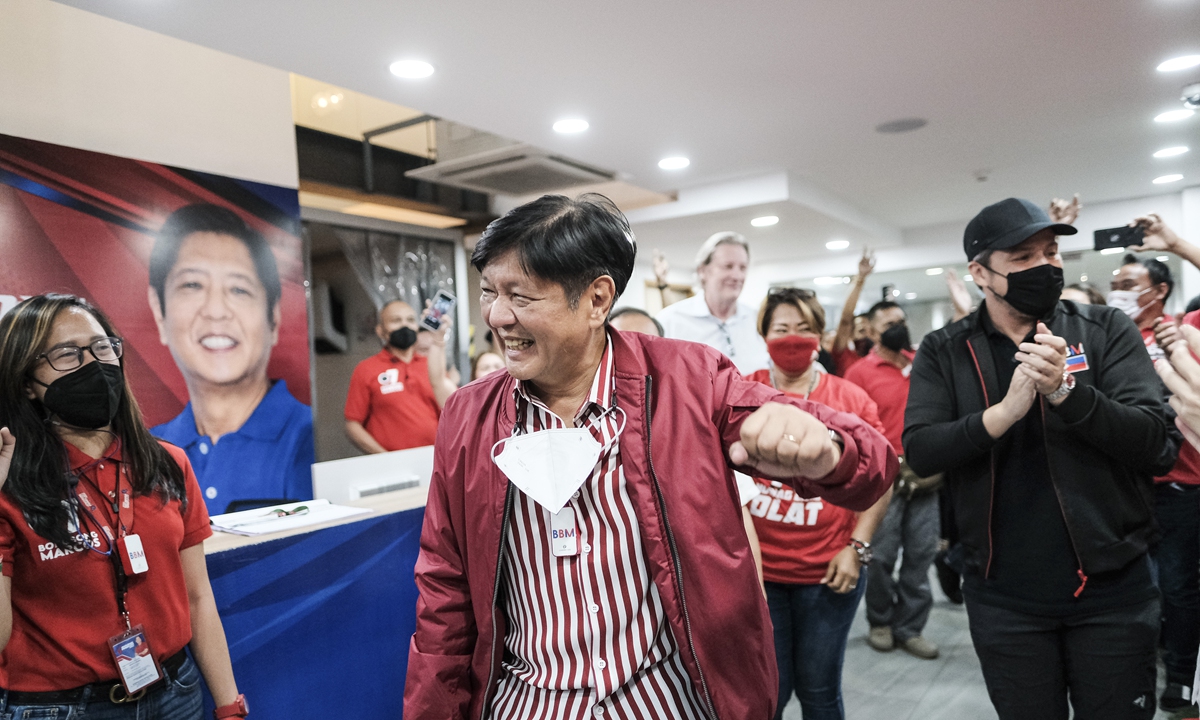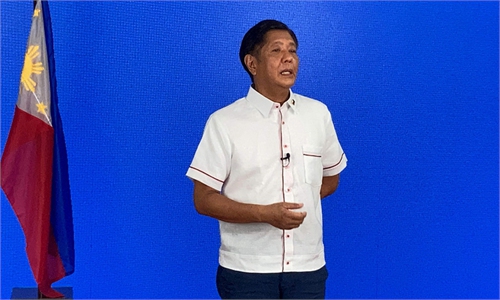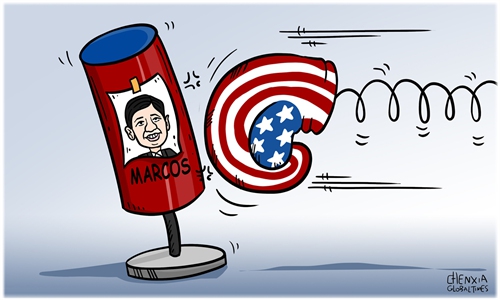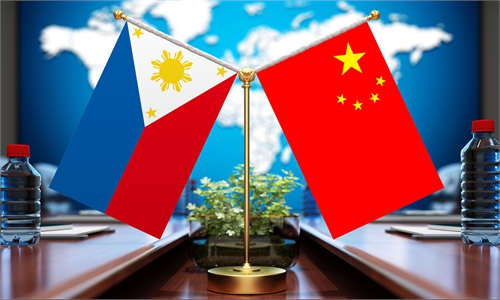Chinese VP to attend Philippine presidential inauguration; experts say ties likely to remain friendly under Marcos, Jr

Ferdinand Marcos Jr. arrives at his campaign headquarters in Mandaluyong City, Manila, the Philippines, on Monday, May 9, 2022.Photo: VCG
As the special representative for Chinese President Xi Jinping, Chinese Vice President Wang Qishan will attend the inauguration ceremony for the Philippines' president-elect Ferdinand Romualdez Marcos in Manila on June 30, the Chinese Foreign Ministry announced on Tuesday, with experts saying the positive development of China-Philippine relations in the past six years made ties enter a mature stage, despite some uncertainties and the impact from the US, and the two countries will keep managing the differences, and continue developing beneficial relations in the era of Marcos, Jr.
Zhao Lijian, a spokesperson of the Chinese Foreign Ministry, said at a routine press conference on Tuesday that China and the Philippines are close neighbors and important partners for cooperation. "China has always placed ties with the Philippines in a prioritized position of diplomacy to neighboring countries."
In recent years, under the joint efforts of both sides, the China-Philippine relations have continually improved, and brought concrete benefits to the people of both sides, and the visit of Vice President Wang as special representative for President Xi to the inauguration ceremony of President Marcos thoroughly shows that China values ties with the Philippines, Zhao said.
"Hopefully, this visit will be helpful for both sides to inherit friendship, improve mutual trust, continue cooperation, and open a broader future of development for China-Philippine relations," Zhao said.
Chen Xiangmiao, an assistant research fellow at the National Institute for South China Sea Studies, told the Global Times on Tuesday that thanks to the foundation laid by Rodrigo Duterte, ties have witnessed a series of progress.
"China continues to be the biggest trading partner of the Philippines, and also increased direct investments to the Philippines, especially in infrastructure construction, including hospitals, bridges, roads and hydropower stations, and there are still great potentials for both sides to improve the existing cooperation," Chen noted.
Apart from the infrastructure cooperation and trade, in fields like energy and food security, as well as agriculture, the two sides still have space to cooperate, especially under the impact of the latest turbulence in the international situation, such as the Russia-Ukraine crisis and Western sanctions against Russia, Chen said. "The Philippines is facing challenges in these aspects," he noted.
Another significant legacy for ties left by the Duterte administration is the handling of the South China Sea issue, and dialogue and coordination mechanisms have been established to manage the problem, said experts.
"For instance, in 2017, both sides established the bilateral mechanism for negotiations and coordination on the South China Sea issue, and this mechanism has helped with timely communication and handling over the divergences and cooperation in the sea, which effectively avoid uncertainties brought by the South China Sea issue," Chen said.
Apart from this, China and the Philippines also established the law-enforcement cooperation mechanism between the coast guards of the two countries. In January 2020, a Chinese coast guard vessel also made its first visit to the Philippines, which is a significant breakthrough for bilateral ties on maritime issues, Chen said.
The six years of the Duterte administration's term saved and fixed ties worsened by the Aquino administration, said Chinese analysts, noting that the ties are likely to continue this positive trend, and even if there are some challenges and impact from external forces, the general direction of China-Philippine relations won't be changed significantly.
"Duterte has changed the former president Benigno Aquino III's one-sided policy toward the US," Xu Liping, director of the Center for Southeast Asian Studies at the Chinese Academy of Social Sciences in Beijing, told the Global Times on Tuesday.
Duterte adhered to an independent and pragmatic foreign policy toward China, and enhanced the political mutual trust between the two countries, Xu noted.
The US is a key factor that could bring a negative impact to China-Philippine ties. The US doesn't want to see China-Philippine ties develop along the positive track, but wants to use the Philippines as a pawn to serve its strategy to contain and compete with China in the region, to lower the cost for the US to conduct military surveillance in the region and to use the South China Sea issue to hype conflicts and increase arm sales, Chen noted.
The key to future China-Philippine relations is to properly handle the differences between the two countries, especially the South China Sea issue. Relations should not be meddled by external factors, but should focus on common issues for efficient dialogue and consultations, including the promotion of some key strategic initiatives between the two sides, Xu said.




